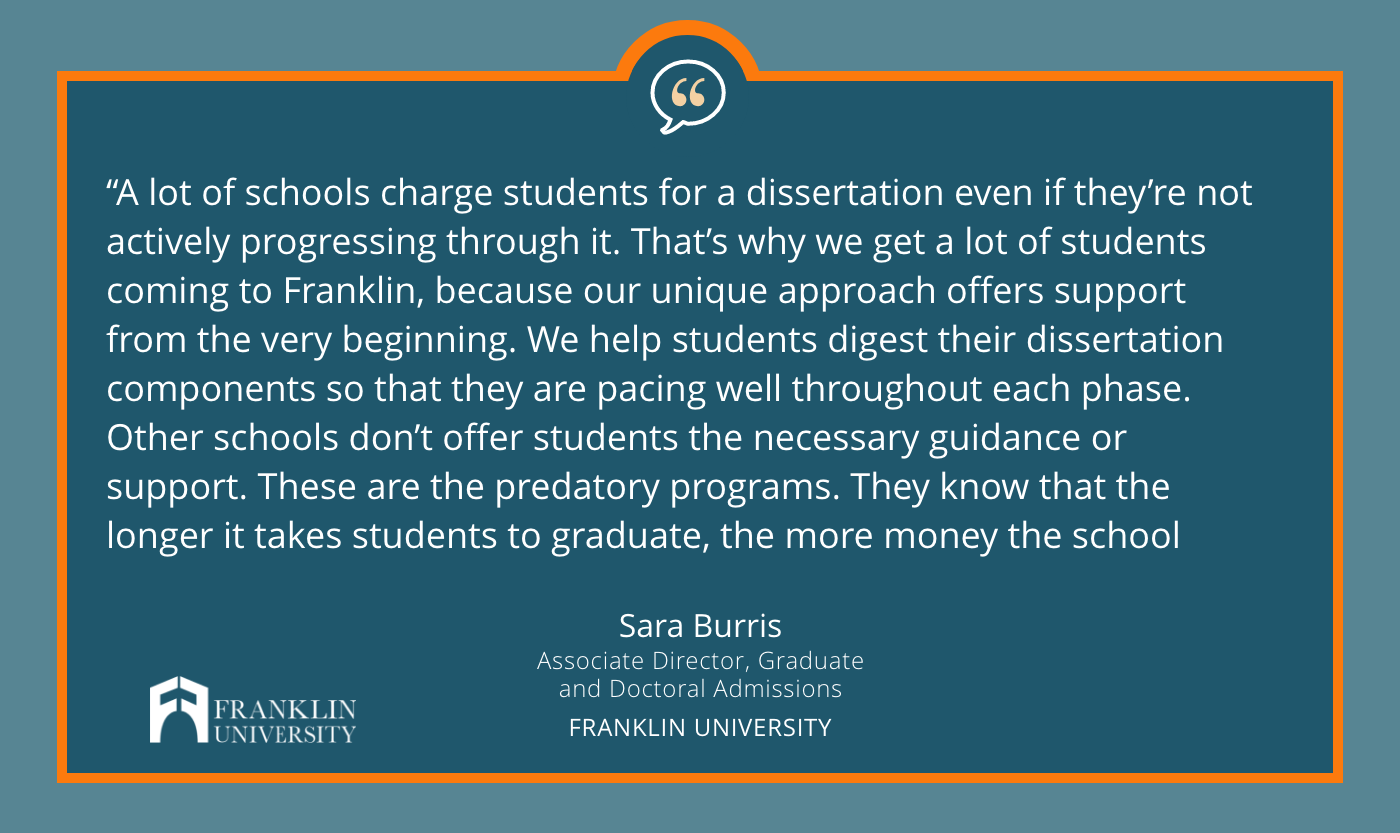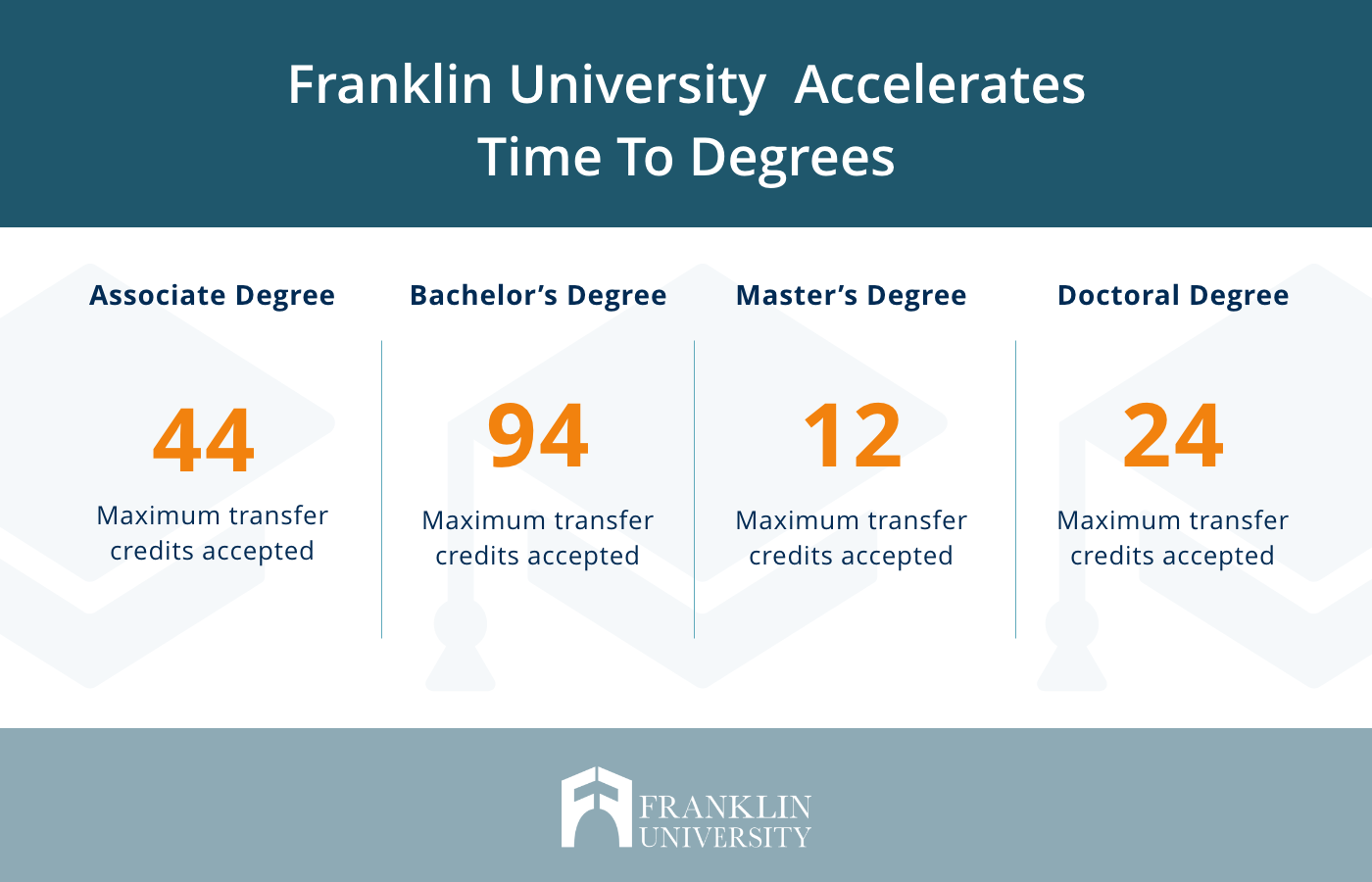Request Information
We're Sorry
There was an unexpected error with the form (your web browser was unable to retrieve some required data from our servers). This kind of error may occur if you have temporarily lost your internet connection. If you're able to verify that your internet connection is stable and the error persists, the Franklin University Help Desk is available to assist you at helpdesk@franklin.edu, 614.947.6682 (local), or 1.866.435.7006 (toll free).
Just a moment while we process your submission.

Can You Transfer Credits From a Completed Degree?
The job market is always changing. Earning a second degree can equip you with new skills and position you for long-term growth opportunities.
Whether you're considering earning a terminal degree to advance in your field or pursuing a second undergraduate degree to change careers completely, you want to maximize transfer credits to accelerate the process. In many cases, you can be awarded credit from a completed degree. However, transfer policies vary by program and degree type.
While every program sets their own unique rules for transfer credits, we’ve created this high-level guide of what to know about the most common scenarios.
Can You Transfer Credits From A Completed Bachelor’s Degree To A Second Bachelor’s Degree?
Yes, the majority of universities accept transfer credits from a completed degree. Most schools will accept the general education credits from your completed degree, allowing you to focus on major courses. You should be aware that most schools have a residency requirement that 25% of credits must be earned at their institution. Each college sets its own unique rules, so work with your advisor to make sure you understand which credits will transfer.
If you’re considering going back to school, choosing between a second bachelor’s and a master’s degree is an important decision. The best path depends on your career goals. For those making a complete career change, earning a second bachelor’s shows employers that you’re knowledgeable in a new field. A bachelor’s degree is also less expensive and less rigorous than a master’s, especially if you can apply credit from your completed degree toward your second. However, in some fields a master’s degree may be the best way to distinguish yourself as an expert and earn promotions. How much time might be saved via transfer credits can play a key role in your decision.
Can You Transfer Credits From A Completed Bachelor’s Degree To A Master’s Degree?
While there may be a few master’s programs that award transfer credit for bachelor's coursework, most master’s programs will not. At the master’s level, coursework tends to be more specialized than the undergraduate level. Bachelor’s courses often don’t meet the standard of rigor and complexity required to be relevant to master’s coursework. Additionally, each master’s program defines subjects differently, making it difficult to transfer credits even from one master’s program to another.
A master’s degree can increase your earning potential considerably. However, before committing, make sure a master’s is beneficial in your field. For those looking to break into a new field, earning a master’s won’t necessarily land you a high-paying job. Most companies expect you to have a related bachelor’s degree and work experience in the field in order to reach the executive level. Aligning your undergraduate degree and your long-term career goals will help you get accepted to a great master’s program and jumpstart your career.
Accelerate your completion time and lower your total tuition cost at every academic level. Download this free guide for tips on maximizing your transfer credit.
Can You Transfer Credits From a Completed Bachelor’s Degree to an Associate Degree?
Associate programs commonly award credits from completed bachelor’s degrees. Advancing in your career doesn’t always mean pursuing an MBA or doctorate. Many working professionals find that earning an additional associate degree helps them pick up a specific skill or prove their commitment to a new industry. Students with a bachelor’s degree likely have most or all general education requirements completed and can immediately jump into the subject matter that interests them.
One thing to consider is earning an Associate of Applied Science (AAS) degree. AAS degrees are designed to help students enter the workforce immediately after graduation, and in many industries are considered terminal degrees. On the other hand, if you’re interested in eventually pursuing a bachelor’s degree, an Associate of Science (AS) degree will more easily transfer to a four-year school. When choosing between AAS and AS programs, you should consider the education and work experience requirements for the positions that interest you.
Can You Transfer Credits From A Completed Master's Degree To A Doctorate Degree?
If you’ve completed your master's degree, some doctoral programs will award credit for certain master’s coursework. To determine which credits qualify, university review panels evaluate each course individually to ensure students match the academic profile of their program. If the course syllabus and learning objectives are equivalent to a course offered at the doctoral program, you may earn credit. Each program is different. Franklin University is a transfer-friendly institution, allowing students to transfer up to 40% of the credits required for a doctoral degree.
When choosing a doctoral program, it’s important to compare apples to apples. Just because one program grants you more transfer credit than another doesn’t mean it will be more cost effective in the long run. Compare cost per credit to develop a comprehensive view of overall cost. You also want to watch out for hidden costs. Some schools charge students for their dissertation even when they’re not making meaningful progress. Franklin offers an embedded dissertation program to help students complete their dissertation as part of their coursework and graduate faster.

Can You Transfer Credits From a Completed Associate Degree To A Bachelor’s Degree?
If you’ve completed an associate degree, or even just completed some coursework, you may be able to earn transfer credits. Each institution will evaluate your coursework to determine how they apply to your new bachelor’s degree program. Your general education requirements are normally met through your associate degree transfer, leaving just two years of coursework to complete.
More than just previous college coursework can qualify for credit. Don’t be afraid to think outside the box during the transfer process. If you’ve gained valuable life experience since you were last in school, chances are it can count toward your bachelor’s degree. Transfer-friendly schools like Franklin University make an effort to maximize your transfer credit. Ask your advisor about earning credit from many sources, including work experience and test scores from an external testing company.

Can You Transfer Credits From a Completed Associate Degree to A Master’s Degree?
Similar to transferring credits from a bachelor’s degree to a master’s degree, transferring credits from a completed associate degree to a master’s degree is rare. In addition to the increased complexity of coursework at the master’s level, many master’s programs have residency requirements. Because the program is short to begin with, a master’s degree is the most difficult academic level to transfer credit into.
Though rare, there are progressive schools that offer pathways to help students in certain industries earn their master’s. Franklin University’s RN to MSN program offers a streamlined path for registered nurses with an associate degree in nursing (ADN) to earn a master’s degree in nursing.
If you’re an associate’s degree holder and you’re considering earning your master’s, keep in mind that you’re jumping an entire academic level. Be prepared for courses with a higher degree of difficulty. Though you may have less academic experience, students who are confident in their ability may be able to find a pathway that helps them learn the skills they need to advance. Choosing a transfer-friendly school that will support your academic journey makes all the difference.
The X-Factor For Transfer Credit: Getting Familiar With Articulation Agreements
One of the best ways to maximize your transfer credits is through articulation agreements. An articulation agreement is a contract between schools agreeing to accept transfer credits. Think of them as proactive partnerships that help take the guesswork out of transferring.
Franklin University’s generous transfer credit policy includes articulation agreements with many programs. Many times, Franklin advisors help students develop a long-term plan and maximize credits before they even apply.
Franklin also offers predetermined pathways to simplify the transfer process. For example, Franklin University’s Community College Alliance offers a 3+1 program, which creates seamless pathways for community or technical college students to earn their bachelor’s degree. You can earn 75% of your credits at a lower tuition rate, which can save 40% of the total cost of a bachelor’s degree.
Choosing The Right Program For You
Earning a second degree can help you increase your specialization in your field or learn skills in a new field, and transferring credits makes it all happen faster. Every institution has unique rules for accepting transfer credits. It’s important to choose a transfer-friendly program that maximizes transfer credits from a completed degree so you can reach your educational goals faster.
As a best-in-transferability school, Franklin University makes an effort to accept all types of transfer credit possible. Each student is paired with a transfer credit team to help choose the best education path and maximize transfer credits in the process.
Start your research with an instant unofficial transfer credit evaluation through the MyTransfer Credit tool or learn more about Franklin’s transfer credit policy.





